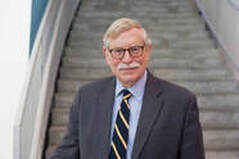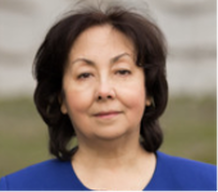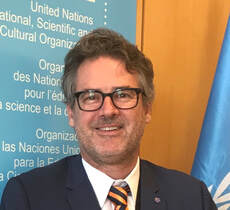The JSPG governing board
JSPG's governing board is comprised of leading science policy scholars and practitioners who share the JSPG's mission of empowering students and early career researchers to substantively engage in the policy debate through research and writing. The governing board provides guidance on outreach, business development, partnerships, fundraising, and strategic planning.
Follow JSPG on Twitter, Facebook, LinkedIn, Instagram, and YouTube. Subscribe to our newsletter.
Follow JSPG on Twitter, Facebook, LinkedIn, Instagram, and YouTube. Subscribe to our newsletter.
|
Chair of the Board
|
Erin Heath is the Director of Federal Relations at the American Association for the Advancement of Science (AAAS), the world’s largest general scientific society. Erin handles a range of policy issues of interest to the scientific community and is heavily involved in efforts to empower scientists and engineers to engage with policymakers, the media, and the public. She co-chairs the Coalition for National Science Funding, the Engaging Scientists and Engineers in Policy Coalition, and the steering committee of the Golden Goose Award. Before joining AAAS, Erin worked for the American Institute of Biological Sciences, where she led the organization’s media training and outreach efforts and cut her teeth on science policy. She also worked in the United Kingdom Parliament as a Research Assistant. She spent years as a journalist in Washington, most notably as a science policy reporter and columnist for the National Journal. Follow Erin on Twitter at @PublicHeath.
|
|
William B. Bonvillian is a Lecturer at the Massachusetts Institute of Technology (MIT) and Senior Director for Special Projects at MIT’s Office of Digital Learning. He is the former Director of MIT’s Washington, DC office where he led MIT’s federal relations and efforts in science policy for 11 years. Prior to that, he served for 17 years as Legislative Director and Chief Counsel to Senator Joseph Lieberman. His legislative efforts in the senate included science, technology, and innovation policy issues. He worked extensively on legislation, creating the Department of Homeland Security, intelligence reform, defense and life science R&D, and national competitiveness and innovation legislation. He has lectured and given speeches before numerous organizations on science, technology, and innovation questions, and he has taught in this area at MIT, Georgetown University, and Johns Hopkins SAIS. He chairs the Committee on Science, Engineering Public Policy at AAAS, serves on the Innovation Policy Forum standing committee of the National Academies of Sciences and on the board of the Information Technology and Innovation Foundation. He was elected a AAAS Fellow in 2011, was the recipient of the IEEE Distinguished Public Service Award in 2007 and is co-author of Advanced Manufacturing: The New American Innovation Policies by MIT Press and two other books.
|
|
|
Mehrdad Hariri is the Founder and CEO of the Canadian Science Policy Centre, a non-profit hub for science, technology, and innovation policy in Canada. He founded the national annual Canadian Science Policy Conference (CSPC), a national multidisciplinary forum dedicated to the Canadian Science Technology and Innovation Policy discussions, engaging hundreds of organizations from various sectors and across the country to discuss the most pressing issues in Canadian science and innovation policy. Mehrdad Hariri has numerous publications and opinion pieces in various media outlets, and regularly appears in media as a commentator on science policy issues. Follow Merhdad on Twitter at @MehrdadHariri.
|
|
Larisa K. Schelkin is the CEO, President and Founder of the Global STEM Education Center. Larisa is a teaching faculty at the United National Institute for Training and Research (UNITAR) Global Diplomacy Initiative Fellowship Program. She is also a UNITAR Fellow on Global Diplomacy, and was previously a Fellow on Education Policy at the Rennie Center for Educational Research and Policy & Institute for Education Leadership (IEL), and a Fellow and Board member of Massachusetts Academy of Science. Larisa studied Global Education at Harvard University Graduate School of Education. She has developed over 35 Global STEM projects and established partnerships with K-12 schools & universities in 12 countries. Larisa is a strong advocate for science diplomacy, for women in science and engineering and for diversity and inclusion in STEM. She holds BS and MS in Petroleum Engineering & MS in Computer Science.
|
|
|
Tobin (Toby) Smith is the Vice President for Policy and Global Affairs at the Association of American Universities (AAU), where he provides strategic leadership and management to the association’s priorities, and oversees matters relating to science and innovation policy, broader impacts of science, and AAU’s international activities. Prior to joining AAU, Toby worked as a federal relations representative in the Washington D.C. Offices of the University of Michigan and the Massachusetts Institute of Technology. He began his Washington career on Capitol Hill as a Legislative Assistant to Congressman Bob Traxler. Toby has written and spoken widely on science policy and funding issues. He is the co-author of the widely used text, Beyond Sputnik – U.S. Science Policy in the 21st Century by University of Michigan Press. He currently serves on the Advisory Board to the National Alliance for Broader Impacts, and is co-chair of the Engaging Scientists and Engineers in Policy Coalition. He is also a fellow of the American Association for the Advancement of Science. Follow Toby on Twitter at @SciPolGuy.
|
|
Kaye Husbands Fealing is the Dean and Ivan Allen Jr. Chair, Ivan Allen College of Liberal Arts at the Georgia Institute of Technology, where she served as the former Chair of the School of Public Policy. She specializes in the science of science and innovation policy, the public value of federal research expenditures, and the underrepresentation of women, minorities and people with disabilities in STEM. Before arriving at Georgia Tech, Husbands Fealing was a professor of public policy and economics at the University of Minnesota and Williams College (respectively), a Study Director at the National Academy of Sciences, and a Visiting Scholar at MIT’s Center for Technology Policy and Industrial Development. She was the founding Program Director of the National Science Foundation’s Science of Science & Innovation Policy (SciSIP) program and also an NSF economics Program Director. She serves on numerous advisory boards, committees and review panels, including for the NSF, NIH, the National Academy of Sciences, and the Council of Canadian Academies. She is an elected Fellow and member of the Executive Board of the American Association for the Advancement of Science. She is an elected Fellow of the National Academy of Public Administration. She is co-editor of The Science of Science Policy: A Handbook, and Measuring the Economic Value of Research: The Case of Food Safety.
|
|
Melanie Roberts is Director of State and Regional Affairs at the Pacific Northwest National Laboratory, a U.S. Department of Energy national laboratory. Previously, Melanie served as a science policy consultant focused on the ethics of science and technology and higher education reform. She was founding Executive Director of the AAAS Emerging Leaders in Science & Society program where she helped graduate students build leadership skills through collaborative community-oriented projects. Prior to working for AAAS, she was at University of Colorado-Boulder, where she served as Assistant Director for the Biofrontiers Institute and as a Research Fellow at the Center for Science & Technology Policy Research. She began her policy career as a AAAS Science & Technology Policy Fellow at the U.S. Senate and the NSF. She has served on a number of boards and committees for the National Academy of Sciences, Olin College of Engineering, Engineers & Scientists Acting Locally, and the National Alliance for Broader Impacts. She is an Elected Fellow of AAAS.
|
Past Governing Board members
|
|
Kei Koizumi was a Senior Advisor in Science Policy at the American Association for the Advancement of Science (AAAS) from 2017 to 2019, after 8 years as Assistant Director for Federal Research and Development and Senior Advisor to the Director for the National Science and Technology Council at the White House Office of Science and Technology Policy (OSTP). Before joining OSTP, he served as the Director of the R&D Budget and Policy Program at the AAAS. He received his M.A. from the Center for International Science, Technology, and Public Policy program at the George Washington University where he was an instructor. Kei is author of numerous reports and publications and is frequently called on to speak on science policy by the media and national organizations. He is an elected Fellow of the AAAS. Follow Kei on Twitter at @KeiinDC.
|
|
|
Ernesto Fernández Polcuch is a Science Diplomat, specialist in Science, Technology and Innovation (STI) Policy. He has a long experience in the United Nations System, leading a Country Office, as well as teams and programs in STI Policy and Science and Technology Statistics at various levels, with a global scope and a focus on Latin America and Africa. In these capacities, he has established and managed programs in Evidence Based STI Policy, R&D and Innovation Statistics, Science Communication, Gender and STEM, Open Science, Science Diplomacy, and Science-Policy-Society linkages. He has also worked as a researcher and lecturer at the National University of Quilmes, Argentina, and other universities in the region, as an adviser to the National Secretary for Science, Technology and Innovation in Argentina, and as a consultant to various National and International agencies.
|
|
John C. W. Randell is the Principal Alliance Manager for the Human Cell Atlas initiative, based at the Eli and Edythe L. Broad Institute of MIT and Harvard. He was previously the John E. Bryson Director of Science, Engineering, and Technology Programs and Senior Program Director at the American Academy of Arts and Sciences, where he served as the staff director for studies on federal research policy, public trust in science, international scientific collaboration, clean energy adoption, and vaccine acceptance. Prior to joining the American Academy, he was a post-doctoral fellow at the Massachusetts Institute of Technology and a Visiting Assistant Professor of Microbiology at Kathmandu University Medical School in Nepal, before joining the Academy as a Hellman Fellow in Science and Technology Policy. He serves on the National Conference of Lawyers and Scientists and on the advisory board for the Network of African Science Academies.
|
|
|
Deborah D. Stine is President of Science, Technology, and Innovation Policy Analysis & Education, LLC. Previously, she was Professor of the Practice in Engineering and Public Policyat Carnegie Mellon University. Prior to CMU, Debbie worked in the White House as the Executive Director of President Obama’s Presidents Council of Advisors on Science and Technology and as a Science and Technology Policy Specialist with the Congressional Research Service. She has also served as the Founding Director of the Christine Mirzayan Fellowship Program and Associate Director of the Committee on Science, Engineering, and Public Policy at the U.S. National Academies of Sciences, Engineering, and Medicine. Debbie has worked as a mathematician for the Air Force, an engineer for the state of Texas, and a policy manager for the Chemical Manufacturers Association. She holds a BS in mechanical and environmental engineering, an MBA, and a PhD focusing on science and technology policy analysis. Debbie is also an Associate Editor for the journal Research Policy and Strategic Management. She teaches, advises, and speaks widely on a wide range of science, technology, energy, environment, and innovation policy topics.
|
|
|
David M. Hart is a Professor of Public Policy and Director of the Center for Science, Technology, and Innovation Policy at George Mason University and a Senior Fellow at the Information Technology and Innovation Foundation, the world’s top-ranked science and technology think-tank. Hart’s current work focuses for clean energy innovation. He co-authored Unlocking Energy Innovation (MIT Press, 2012) and has published numerous articles on energy innovation policy in academic and policy audiences. He served as Assistant Director for innovation policy at the White House Office of Science and Technology Policy, where he focused on advanced manufacturing issues and as Senior Associate Dean of the George Mason Schar School of Public and Government. He currently co-chairs the Innovation Policy Forum at the National Academies of Science, Engineering, and Medicine. Follow David on Twitter at @ProfDavidHart.
|
|
Lida Beninson is a Senior Program Officer for the Division of Policy and Global Affairs at the National Academies of Sciences, Engineering, and Medicine (NASEM). With experiences in science and technology policy, STEM education, data science, biomedical research, and agricultural biotechnology, Lida pursues opportunities to serve society through her diverse scientific expertise. She served as Editor-in-Chief of the Journal of Science Policy and Governance and was a recipient of the American Institute of Biological Sciences Emerging Public Policy Leadership Award. While serving as an AAAS Science and Technology Policy Fellow with the National Science Foundation, Lida engaged in cross-agency initiatives to improve diversity and inclusion in STEM fields, promote K-12 computer science education, and develop a federal strategic plan in data science research. Recently she served as the director for a Congressionally mandated study on the biomedical research workforce and is currently leading a project on the impact of athletic programs on university governance and student-athlete education.
|














